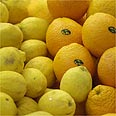
Settlement products to be labeled?
Photo: Marianne Hall
First report: The British government advised all food chains in the UK to clearly mark any imported products made in Judea, Samaria, and the Golan Heights, Ynet learned Thursday.
The decision prompted deep dissatisfaction at the Foreign Ministry, which characterized the step as "capitulation to Palestinian organizations." However, British officials insist that the decision does not constitute a boycott against Israel
According to information received at the Ministry Thursday afternoon, the British government recommended that a prominent label be placed on hundreds of Israeli products made in Israeli settlements.
British officials are saying that the new move does not constitute a boycott, but rather, aims at transparency in a bid to warn consumers who do not wish to purchase such products. However, Israeli officials are unconvinced by the explanation and see the latest move as further escalation in the British trend to initiate boycotts of various kinds.
"We are talking about a worrisome move," a diplomatic source in Jerusalem told Ynet. "No similar move has been undertaken in any other country. What's concerning here is the conspicuous designation of Israeli products under guise of transparency and concern for British consumers."
Britain's embassy dismissed suggestions that the decision constitutes an official boycott against Israel, stressing that the latest move is merely a recommendation and that food chains are not obligated to mark products made in settlements. Up until now, products were marked as "made in the West Bank," without letting consumers know whether the product was made in a Jewish or Arab community, the embassy said.
At this time, no anti-Israel boycotts are in place in Britain, and the British government has always objected to boycotts and will continue to resist them, the embassy said.















